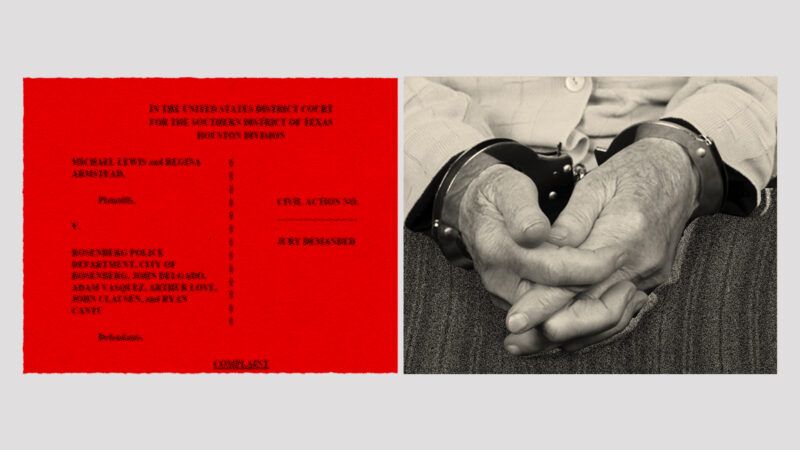Texas Residents Sue After Police Allegedly Hold Them at Gunpoint and Break Man's Dialysis Port
The lawsuit says police in Rosenberg, Texas, have a history of excessive force and unlawful searches, especially against those with medical vulnerabilities.

An elderly Texas man and his partner say in a lawsuit filed Thursday that they were held at gunpoint and subjected to a painful and illegal traffic stop that left him with a broken dialysis port.
Michael Lewis, 67, and Regina Armstead, 57, allege in a federal civil rights lawsuit that they were driving back home in Rosenberg, Texas, after picking up lunch when they were pulled over by police. The lawsuit says that Rosenberg police officers, who were searching for a group of teens that had allegedly brandished a gun, held the couple at gunpoint, handcuffed and detained them, unlawfully searched their car and seized Armstead's phone, and destroyed a life-saving medical device installed in his arm, all despite the couple obviously not being teenagers.
The lawsuit, filed on Lewis and Armstead's behalf by lawyers with the National Police Accountability Project (NPAP), is seeking damages for violations of the couple's Fourth Amendment rights and reforms of the Rosenberg Police Department.
According to the suit, Rosenberg officers trained their guns on the elderly couple, forced them to throw their keys out the window and get onto their knees, and handcuffed them. Lewis tried to explain to the officers that he had a stint in his hand for regular dialysis treatment and that his doctor had instructed him not to place any pressure on it, but the officers ignored him.
Police also confiscated their cell phones and searched their car, the suit says. The couple was detained for 45 minutes before they were finally released. According to the lawsuit, "as a result of the handcuffing during his arrest, Mr. Lewis's medical device in his wrist malfunctioned. This resulted in three separate medical procedures to replace his fistula."
Lewis and Armstead had to contact the police department to retrieve Armstead's cell phone and discovered that the key fob for their car had been destroyed in the altercation. The police department refused to compensate them for the fob.
The lawsuit says the treatment of the couple is just part of a string of similar incidents involving the Rosenberg Police Department. "Dozens of civilians have reported that stops by RPD officers left them feeling traumatized and disrespected," the suit says. "Many others suffered physical injuries that required medical attention as a result of their encounters with RPD officers."
Lauren Bonds, one of the attorneys representing the couple, says that complaints against the Rosenberg police that NPAP lawyers received through a public records request ran a gamut of illegal policing: unreasonably long detentions without probable cause, unlawful searches of vehicles' trunks, and frequent claims that officers smelled marijuana in order to justify searches.
But the most striking thing, Bonds says, "was people with medical vulnerabilities who were brutalized and subjected to excessive force."
In 2016, video footage showed Rosenberg officers violently arresting a couple, Christine Saenz and her husband. Saenz and her husband were sitting in their truck after an argument when Rosenberg officers pulled them out of the truck, slammed them to the ground, and began pummeling both of them. Saenz was a cancer patient who had a portable catheter installed in her chest. Both were diagnosed with concussions, according to an excessive force lawsuit filed by them against the city. That lawsuit was later settled.
There are frequent instances across the country of police treating frail and elderly suspects with unreasonably excessive force. For example, Reason reported on the case of Karen Garner, a 73-year-old Colorado woman with cognitive issues who was violently arrested by a police officer for allegedly shoplifting $13 of merchandise from a Walmart. LaDonna Paris, a 70-year-old woman with bipolar disorder, was tackled and bloodied by Tulsa police officers after she refused to leave a bathroom inside a Habitat for Humanity store. The officers' body cameras showed them taunting and laughing at the woman prior to arresting her.
Bonds says Lewis and Armstead have not previously had any negative interactions with the police, but since the incident, they have struggled with the trauma of being held at gunpoint and humiliated.
"They really did try and resolve this amicably," Bonds says. "They went to the police to get the fob replaced and an apology. It wasn't until the police were completely resistant that they started thinking about filing a lawsuit. Our clients aren't vindictive people looking for a payout, they were just trying to get some assurance that this won't happen again."
The Rosenberg Police Department did not immediately respond to a request for comment.
